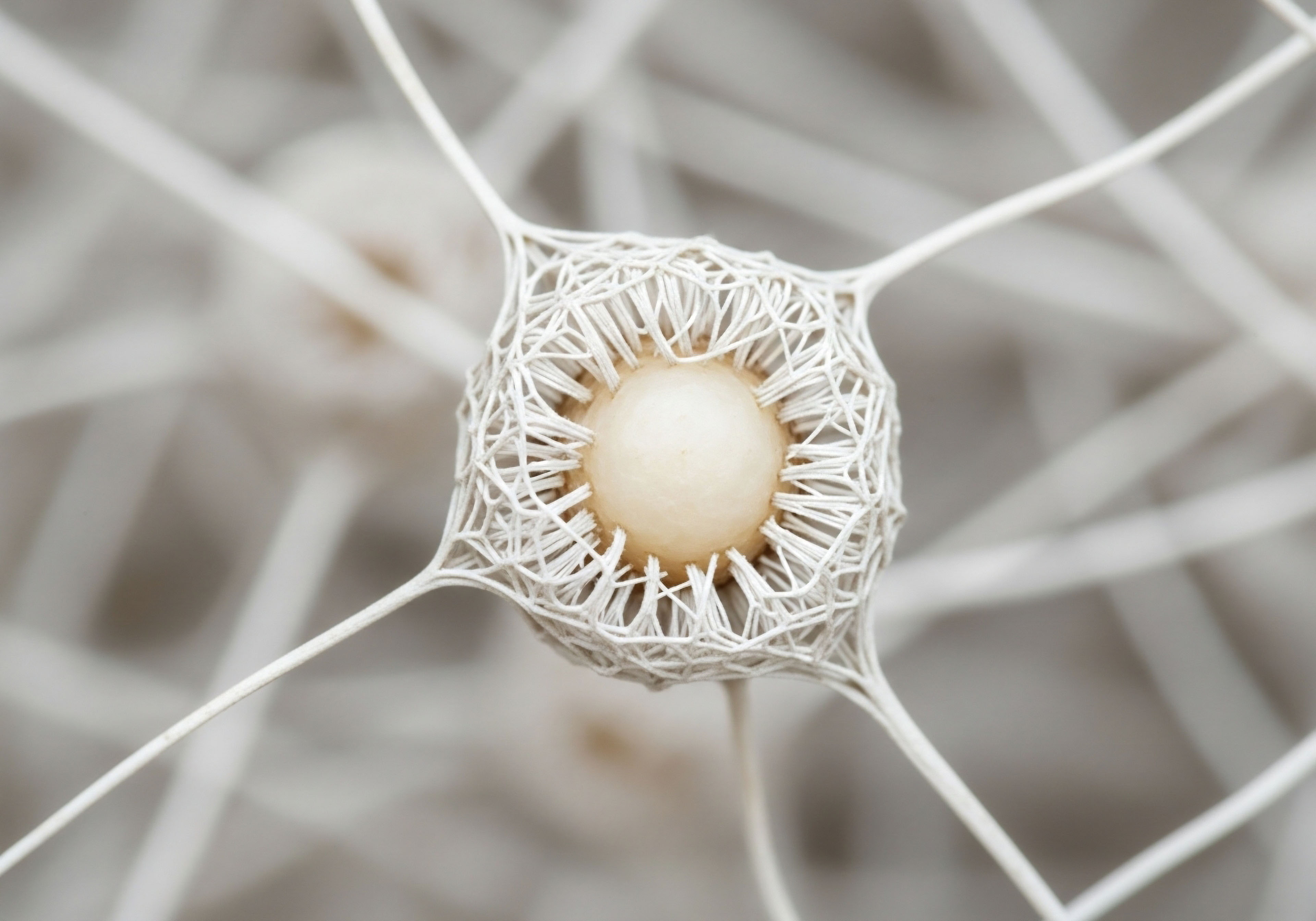

The High Price of Modern Comfort
Your biology is calibrated for a world that ceased to exist millennia ago. It anticipates dynamic environmental inputs, physical challenges, and fluctuating thermal states to maintain peak operational readiness. Modern life, with its climate-controlled interiors and predictable routines, has systematically muted these ancestral signals.
The result is a pervasive state of neurological stasis, a low-grade, persistent fog that dampens cognitive output and blunts the edge of your focus. This is the subtle tax of comfort, an accumulated deficit in the very neurochemicals that drive alertness and clarity.
What you perceive as waning concentration or mental fatigue are accurate signals from a system starved of its necessary triggers. The human machine was engineered to respond to acute, hormetic stressors ∞ brief, intense challenges that provoke a powerful adaptive cascade. Without these inputs, the internal systems governing vigilance and attention idle in a state of perpetual standby.
Reclaiming your mental acuity requires a deliberate reintroduction of these primal signals, a conscious decision to interrupt the static of a comfortable existence and command the release of your own high-performance chemistry.


Triggering the Primal Focus Circuit
Accessing this state of heightened focus is a matter of precise physiological signaling. The protocol leverages a powerful and predictable biological mechanism ∞ cold-induced norepinephrine release. Norepinephrine functions as a master neurotransmitter and hormone, integral to modulating attention, vigilance, and mood. When your body experiences a sudden, significant drop in temperature, it interprets this as an urgent survival signal, triggering a potent and immediate release of norepinephrine from the locus coeruleus in the brainstem and the sympathetic nervous system.
This surge is a systemic reset. It sharpens sensory perception, enhances memory consolidation, and dramatically elevates your capacity for sustained concentration. The process is direct and mechanistic, a way to use a physical stimulus to engineer a specific neurochemical outcome.
One study demonstrated that immersion in 10°C (50°F) water for up to an hour could increase norepinephrine levels by 530% and dopamine ∞ a molecule tied to motivation and mood ∞ by 250%. This is a profound recalibration of your internal state, available on demand.
Immersion in 10°C (50°F) water has been shown to increase circulating norepinephrine by 530% and dopamine by 250% from baseline levels.
Implementing this protocol requires precision over brute force. The objective is to activate the pathway with the minimum effective dose of thermal stress, ensuring a powerful adaptive response without exhausting the system. The key is finding the temperature that is uncomfortably cold, compelling you to want to exit, yet safely manageable for a short duration.

The Deliberate Cold Exposure Protocol
This is a foundational framework for initiating norepinephrine release. Individual response will vary, so begin with shorter durations and gradually adjust as you become acclimated. Consistency is the key to unlocking sustained benefits.
- Temperature Calibration ∞ The ideal water temperature is one that feels genuinely cold and challenging. For many, this range is between 4°C and 15°C (40°F to 60°F). The colder the water, the shorter the required duration.
- Duration and Frequency ∞ The goal is a cumulative weekly exposure of at least 11 minutes, broken into 2-4 sessions. A session might last anywhere from 1 to 5 minutes. Even 20 seconds in very cold water (around 4°C or 40°F) can trigger a significant epinephrine and norepinephrine release.
- Immersion Technique ∞ Submerge the body up to the neck. This maximizes the surface area exposed to the cold, amplifying the signal to the nervous system. Keeping hands and feet submerged can intensify the experience and the subsequent neurochemical response.
- Post-Exposure Rewarming ∞ Allow your body to rewarm naturally. Shivering is a metabolically expensive process that further enhances the adaptive response. Avoid immediately jumping into a hot shower, which can blunt some of the physiological effects by short-circuiting your body’s own thermogenic processes.


Calibrating Your Performance State
The application of this protocol is tactical. It is a tool to be deployed when cognitive performance is paramount. You are moving from a passive state of accepting your mental weather to actively setting the atmospheric conditions of your mind. This is about timing the neurological upgrade for maximum impact on your professional, intellectual, or physical pursuits.
Consider this protocol your primary intervention for breaking through periods of cognitive inertia. It is the definitive countermeasure to the brain fog that settles in after hours of monotonous work or a night of insufficient sleep.
Deploying a cold exposure session before a deep work block can create a two-to-three-hour window of intense focus and mental clarity, driven by the sustained elevation of norepinephrine in your system. The immediate effect is a feeling of heightened alertness and readiness, a state of clean energy devoid of the agitation that accompanies stimulants.
Studies show the sympathetic nervous response to cold can be activated very quickly, with mean norepinephrine concentrations nearly doubling after just two minutes of immersion in 10°C water.
The benefits compound over time. With consistent application, typically within two to three weeks, you will observe a more resilient baseline state. Your ability to manage stress improves, your mood becomes more stable, and your threshold for cognitive effort increases.
The protocol works to remodel your stress-response pathways, making you less reactive to trivial stressors and more capable of sustaining high-output cognitive states. The long-term payoff is a fundamental shift in your neurological terrain, cultivating a mind that is both more powerful and more composed.

Mastering Your Interior Environment
You possess the capacity to directly interface with your own neurochemistry. The knowledge of how a simple, powerful stimulus like cold can so profoundly alter your mental state is a new degree of freedom. It reframes the body as a high-performance system that responds to precise inputs, shifting the locus of control from external circumstances to internal command.
This is the essence of proactive optimization, the understanding that the levers for enhanced performance are within your reach. The only variable is your willingness to engage them.



